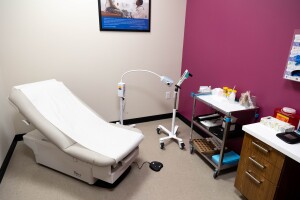
Planned Parenthood exam room in East Austin on June 21, 2023. Patricia Lim/KUT
A recent study published in the American Journal of Public Health reveals that the abortion ban enacted by Texas in 2021 has disproportionately affected minors seeking reproductive care. Following the implementation of Senate Bill 8, which prohibits abortions after fetal cardiac activity is detected—typically around five to six weeks into pregnancy—Texas minors faced significant barriers in accessing abortion services.
Researchers conducted an analysis comparing the nine months following the enactment of SB8 to the same period from September to May in the previous year. The findings highlight a troubling trend: the total number of facility-based abortions provided to minors in Texas plummeted by nearly 60%. In contrast, the decrease among adults aged 25 to 29 was approximately 42%.
Increased Out-of-State Abortions
The study also examined the behavior of Texans traveling out of state for abortions, considering six surrounding states: Arkansas, Colorado, Kansas, Louisiana, New Mexico, and Oklahoma. During the study period, the number of Texas minors who traveled out of state for abortions surged from just 62 prior to the law’s enactment to 366 afterward.
Despite this increase in out-of-state procedures, the overall number of abortions among minors decreased by 26%. The decline was even more pronounced among young adults aged 18 to 24, who experienced a nearly 20% drop in procedures.
Dr. Kari White, one of the researchers and affiliated with Resound Research for Reproductive Health, commented on the challenges facing this demographic. “This is also a group of folks who are just starting out on their own,” she stated. “They may still be living with a parent. They don’t have a lot of extra financial resources. Maybe they don’t even have a car to be able to get someplace out of state.”
Ongoing Impact of Abortion Legislation
This study follows a 2024 analysis from the University of Houston, which indicated a slight increase in births among teenage mothers in Texas after the implementation of SB8. Since the period examined in the AJPH study, further restrictions have been introduced. Following the U.S. Supreme Court’s decision in June 2022 to overturn the federal right to abortion, all abortions became illegal in Texas, except in cases of medical emergencies.
Dr. White expressed concern that the barriers for young individuals seeking abortion care have likely intensified. “Rather than being able to go to Oklahoma for abortion care, people are now facing the closest clinic being in Kansas or Colorado,” she explained.
It is important to note that the study did not account for the increasing use of medication abortions, which have gained popularity in recent years. While data on the use of abortion pills by age group is not yet available, Dr. White emphasized that facility-based care remains essential for certain women due to health factors and gestational age.
As Texas continues to navigate a complex landscape of abortion laws, the implications for minors seeking reproductive health services remain critical and warrant ongoing attention. The study serves as a stark reminder of the barriers faced by vulnerable populations in accessing necessary medical care.







